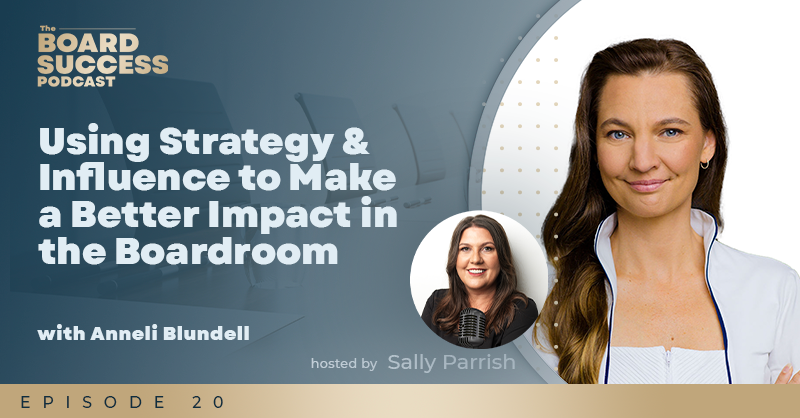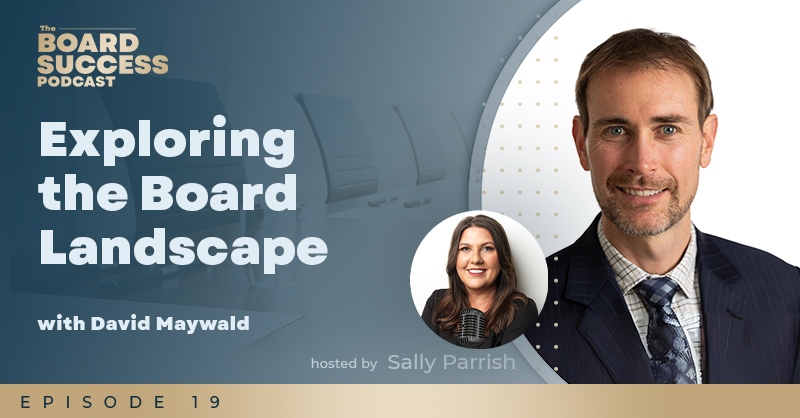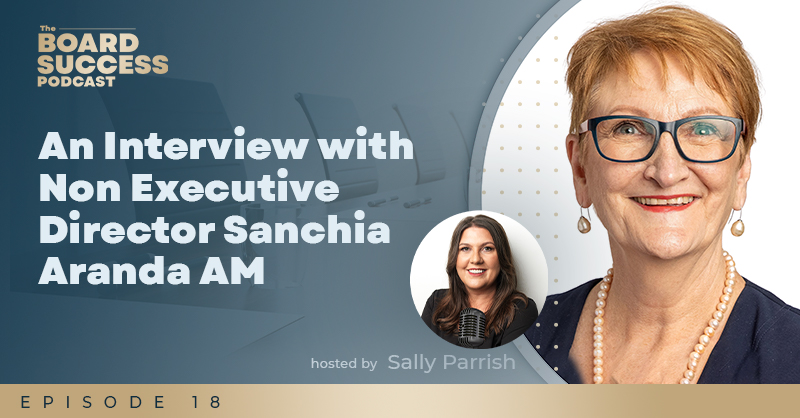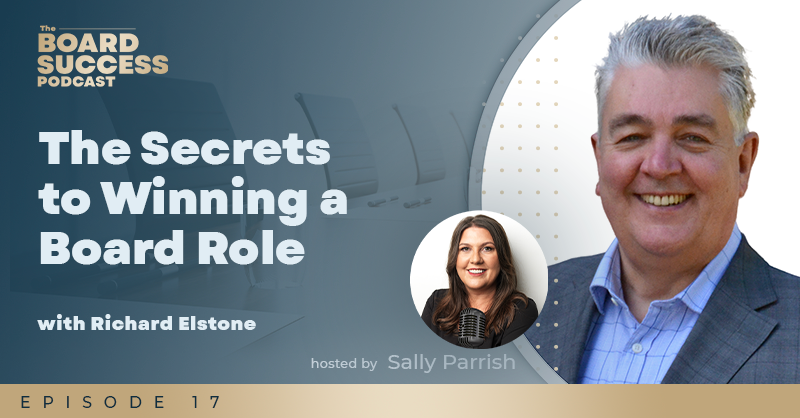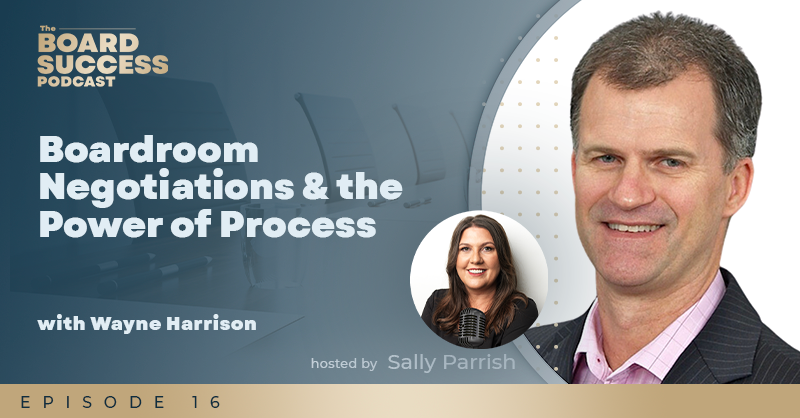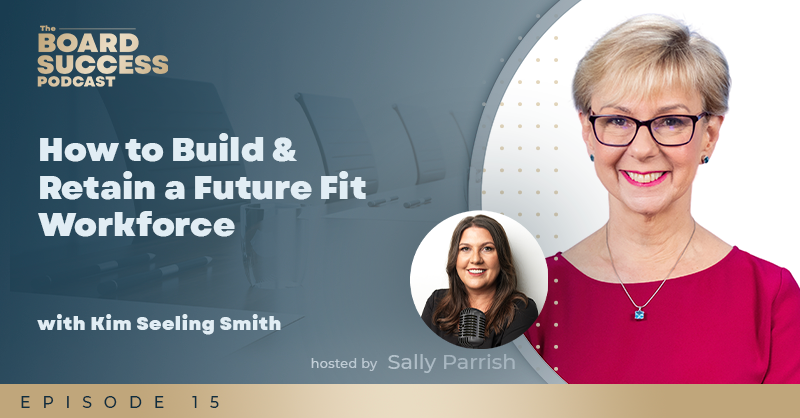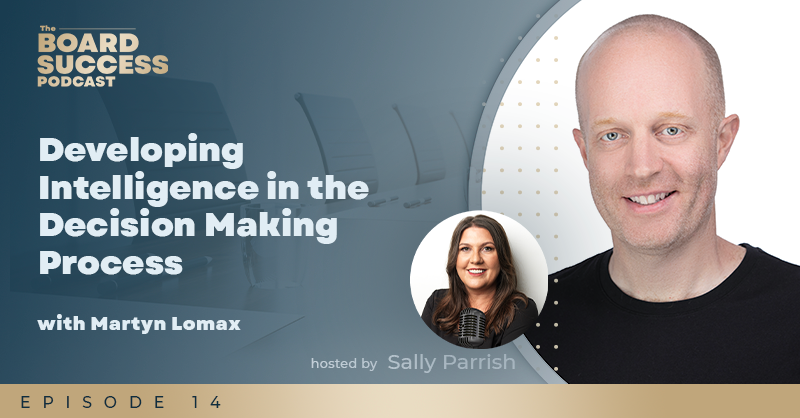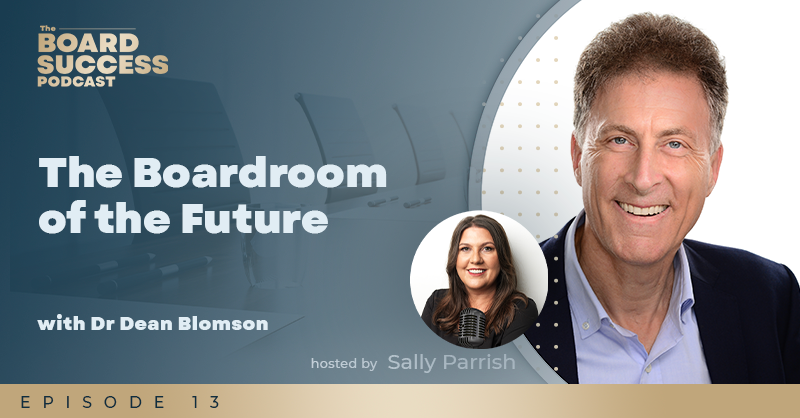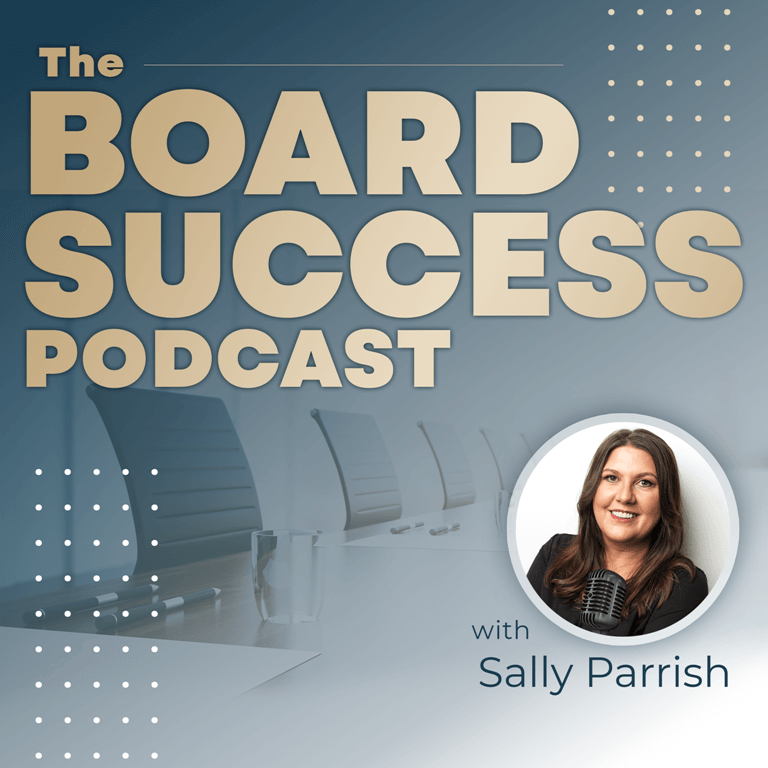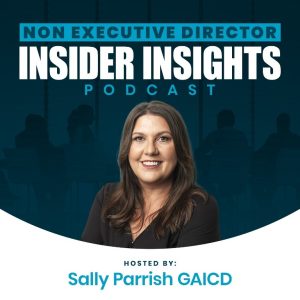Brilliant Board Papers and Board Minutes
Sally Parrish interviews Julie Garland McLellan
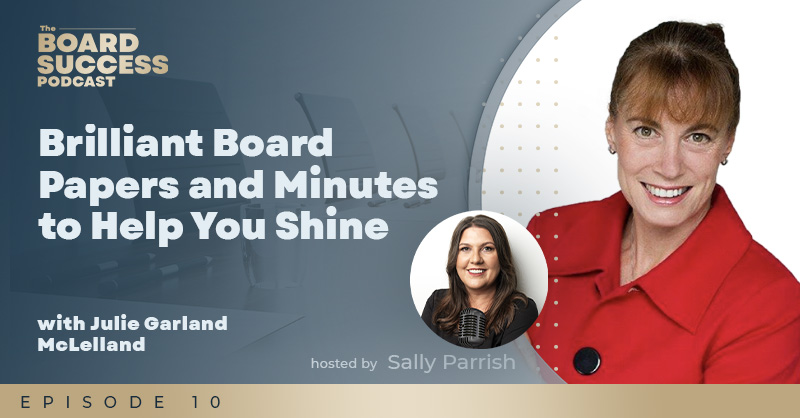
In this episode leading governance expert Julie Garland McLellan shares her advice for effectively compiling board packs and documenting board minutes.
Julie has served on a multitude of boards and her experience in the boardroom includes Chairing the board of an ASX listed business. She is also a frequent speaker at conferences and a prized reference for journalists, where her comments have featured in ABC News’ Nightly Business Report, The Business Programme, The Australian Financial Review, The Financial Times (Britain), Company Director Journal, Keeping Good Companies, and other quality publications.
Julie has more than 20 years’ experience delivering education programs for the Australian Institute of Company Directors (AICD) including 14 courses that she has created. She has also developed and delivered director education for the National Association of Corporate Directors (NACD), Director Institute, Governance Institute of Australia, College of Laws, University of Sydney, CPA Australia, The Taiwan Corporate Governance Association, The Oman Centre for Corporate Governance and Sustainability, and Better Boards Ltd.
FURTHER INFORMATION
To request a copy of the ebook “Documenting your Board Meeting” mentioned today, please email: [email protected]
Website: Directors Dilemma
LinkedIn: linkedin.com/in/juliegarlandmclellan
Twitter: https://twitter.com/JulieGarlandMcL
Youtube: https://www.youtube.com/@BoardroomSkills
Click Here to View the Podcast Interview Transcript with Julie Garland McLellan
We've got a great episode for you today we're joined by the fabulous Julie Garland McClellan. I'm sure a lot of you have met Julie on your travels. Welcome, Julie. Thanks for joining us.
Julie Garland McLelland 02:03
Thank you, Sally. It's great to be here.
Sally Parrish 02:05
Now, Julie's been on the governance circuit for many, many, many years, she sat on both sides of the tables. She is a company director, and also a governance consultant. You've probably seen her on the speaking circuit she presents at industry conferences. You've probably seen her on the TV; she's featured in programs such as ABC News Nightly Business Report, you've probably read her articles in the Australian Financial Review, or maybe overseas in the British Financial Times. She's created multiple educational programs and facilitated lots and lots of events across AICD, the Governance Institute, the National Association of Corporate Directors, CPA Australia. And of course, she also has some incredible books out on governance, as well. Julie, I'm not even sure that I've given you enough credit with that intro. There's just so much expertise that you've got in this space. I'm really excited today, because we're going to talk about the board Minutes. So what is it that you love about this topic? What excites you about it?
Julie Garland McLelland 03:17
Well, board Minutes are the official legal record of what happened. So whatever's in your Minutes, legally for weeks after the meeting, that is what happened, which makes it vitally important that you get them right. And also vitally important that directors check and approve them.
Sally Parrish 03:38
Now getting it right, that's easier said than done, right? Because there's no sort of instruction book on how we do that. I know that there's a big debate out there around how much information should you have in the Minutes because too much information is a problem. Not enough information is a problem. And I guess we're talking about a defensible position when we talk about the degree of information within Minutes. What's your guidance around that?
Julie Garland McLelland 04:10
I like to see more than just a minute of record, which is item number, the board approved item number the board did not approve, that as a company director looking back six months on after you've made a decision and you're querying whether it was wise or not, is useless. Absolutely useless. So you need more detail. I'm nowadays very much guided by the joint statement on Minutes that both the AICD and the Governance Institute of Australia collaborated to put out and they did that after Katherine Livingston had a very tough time in the dock at a Royal Commission about something that she clearly recalled but that was not in the Minutes.
Sally Parrish 05:03
Yeah. And that's a danger, isn't it that while we're discussing things at board level, you know, we all know what we've talked about, we all know what happened. But it's really difficult to look back and get the context of the conversation and the decisions that we were making. I saw once that there was an issue where there was so much information in the Minutes, that it actually trapped the board on another matter where there wasn't so much information recorded. So this was a kind of dubious matter, and there wasn't a lot recorded. And that was not consistent with the minute taking of that board. So I'm guessing consistency is another key element to this?
Julie Garland McLelland 05:53
There is consistency. And there is ‘in proportion’ proportionality. So for a small, unimportant quick decision, you might not record very much. The board noted the statements of conflict of interest or something like that. But for a big decision, you would expect there to be, firstly, a very good board paper so that the directors were across the current thinking on the issue. Secondly, a minute that recorded the key points of the discussion so that if the board or worse still, a regulator, were to look back on that minute, they'd be able to say, Yes, this board was diligent, or no, this board was negligent or reckless.
Sally Parrish 06:49
So, Julie, you've got this really great model that addresses tricky Minutes. Can you talk us through that?
Julie Garland McLelland 06:57
Yes, I love this model, I use it for papers as well as the Minutes. T is for timely it goes on for true. So you need to make sure that your data is correct. And you need to make sure that it gets to the board if it's a paper or a minute, in a timely fashion. Nothing worse than looking at Minutes two months after the meeting, you won't remember if they're correct. Nothing worse as a director than a paper that you get at the last minute. You don't have time to do independent diligent specific research. And that's the legal standard with which you must read your papers. So timely and true. In perspective, if it's important, that should be a longer and bigger paper than something that's unimportant or less important, which can be a shorter and less detailed paper. So when you look at the board pack, you should be able to see what's important and what's not just by how big it is. And you don't want to spend the board time on things that are irrelevant. There's a wonderful study of a board in England. I think it was the British Nuclear Fuels board that spent four times longer discussing where to put the bicycle shed of the new Head Office than they did talking about whether or not they wanted to commission a new nuclear reactor. And the uncharitable assumption from that is that perhaps the directors understood bicycles better than they understood nuclear power. So in perspective, don't spend all of the time and attention on the small things, go for the big ones! Clear and Concise. So you want things that are written in a very easy to read fashion. Unfortunately, people as soon as they start writing for the board, the hearfores and therefore and however, start creeping in passive grammar. And it's just easier if you say it like you would actually say it. So really clear, very simple. Don't use acronyms, don't use technical terms. Just make sure they understand what you're on about. And then the concise board paper should be as short as possible. It should not be too long. It should not be padded out with irrelevant information. And indeed that is the R in the “triccy” is the relevance. Only put in the information that is relevant to the board for the decision they've got to make.
Sally Parrish 09:41
So “triccy”. T for timely, R for relevant. I for perspective, C for clearer, and C for concise. And also we've got the second R for Did you say really happened? True, it's truly happened? Where does this information come from? I've sat in board meetings, and I've seen board Minutes and gone. I don't think I was at that meeting, you know, I'm sure I wasn't there. And we get these conversations that occur after the board meeting that kind of creep into the Minutes as though they occurred at the time of the board meeting, what's your guidance around those types of issues?
Julie Garland McLelland 10:25
Don't do it. Your Minutes are the Minutes of that meeting, don't put anything in there that didn't happen at that meeting, you might want to add a note that, subsequent to the meeting, this decision was changed because new information came to light. But the last thing you want is for a regulator, or worse still, an opposing barrister, to read through your Minutes and come to the conclusion that the board is inclined to occasionally fabricate the information. And the same with Board Papers. If things change, let the board know that things have changed, but don't re edit the papers. And this is particularly important now when we all use board portals so much, because it's easy for me to read my papers two days before the meeting, and then somebody edits them. And I turn up for the meeting, open my portal. And there's a little flashing sign that says, “these papers have been changed since you last read them” well, unfortunately, I haven't had time to read those changes.
Sally Parrish 11:42
And nor should you need to right? If you've done your board preparation. That should be at a time that's prior to the meeting, when you can consider all the facts that you have and go into the meeting prepared, you shouldn't be constantly checking to see if there's any changes before you get into that meeting. So just to be clear, if we're discussing at board level that we're going to make a certain decision. And information comes to light after that. We don't go back and change the outcome of that meeting decision, we still record the incorrect decision. And retrospectively there's a document after the meeting, Sally and Julie had a chat, and this came to light and this was decided and raised with the board. Okay. I think that's, I think that's something that sounds like common sense, but in practice really doesn't happen. The other one I've seen that is really, really tricky is who gets access to these Minutes, who can see these Minutes, that aren't necessarily non executive directors, and how do we control that type of information flow?
Julie Garland McLelland 12:56
Again, I would write the Minutes as if they were going to be on the front page of the Australian Financial Review, and maybe even the Wall Street Journal. Because Minutes are confidential, but they're not legally privileged. And people get them, they can go places that you never intended them to go. So first of all, be very careful. If you have legally privileged information, never put it in your board papers or your board Minutes. always deliver that to the board as a separate standalone item. And if you have it in your agenda that the board will discuss the legal advice they received under separate cover. That's all you need. And again, in the Minutes, the board discussed the advice, don't put the advice or even quotes from it in the Minutes because you will void your privilege. So that's one thing to really look at. The other thing is a lot of companies don't have that many senior managers and a lot of CEOs love to cut and paste from the board Minutes to tell the senior executive team, this is what's happened. And this is the thing that decisions in your Minutes are the power to act for your executive team. So again, encouraging the team to take an interest in the papers and the Minutes is very healthy. But it does mean they have to understand how important and sensitive they are so that they don't actually share them inadvertently or unwisely.
Sally Parrish 14:41
Yeah, that's really good advice. Probably the worst situation I ever found myself in on a board was I'll give very little information so it doesn't give away who it was. But we had an incompetent CEO, and some of the issues around that incompetent CEO was their level of EQ. So you couldn't, you know, have an ‘in camera’ meeting, and we're just going to discuss your performance today and then come back to you, because that would make this person very suspicious and guarded and hostile. And it was really difficult as a board, to have conversations, make decisions and document those decisions when they related to the incapability of the CEO in particular. And not heighten their anxieties and their fears and suspicions by doing things, you know, behind closed doors. And we had conversations about, you know, maybe we have two versions of the Minutes, the formal Minutes and the Minutes we give her like, no, no, no, no, no, no, you can't do that. Maybe we have a redacted version, there's a version of the Minutes that she sees where we redact information. But of course, that's only going to feed the anxiety and the fear. So what would your guidance be around that kind of tricky situation?
Julie Garland McLelland 16:20
Minuting in camera sessions is one of the areas everyone knows we should have in camera sessions. Very few people know how to minute them, even who takes the notes. So there are a couple of options. The first one to deal with the anxiety is to have lots and lots of in camera sessions, have one at the beginning of every meeting. And the aim of the session is for the directors to talk through the meeting they're about to have, so that the chair can already have a unified board view on a lot of the matters, which will make the meeting faster and easier. The second thing is to give the CEO feedback about what was good. So a really good question to ask in the in camera session, what was the best paper in the board pack and why? And then you can say to the CEO, look, we really liked this paper, because of these factors. And the CEO firstly feels “Oh, great”, because it's like, it's a terrible thing to say, but it's like training a puppy, you catch it doing the things you want, and you praise like mad, and then those things get done more. So helping people to understand when they've done the right thing. And to do more of it is often much more useful in developing an executive than catching them when they've done the wrong thing and punishing them because now they know what not to do, but they still don't know what to do. And to do is the hallmark of competence. You need to be careful with your Minutes, Minutes, as I've just said, they're confidential, but they're not privileged. So if you make comments about somebody's competence, in the Minutes, you could be defaming that person. And unfortunately, you'll run into occasions on, for example, a school board where somebody makes an allegation about somebody who's coaching children being inappropriate. That is, on the one hand, you need as a board to make decisions to safeguard the children. But on the other hand, you have a duty not to defame someone. So making that decision, as if you hadn't had that information is very, very weird and strange. So my advice is always look to say that you discussed the CEO performance, but unless you are moving to replace the CEO, be really careful what you say in Minutes, particularly with CEOs because they probably have access to everything. Even if you think they don't. They have ways of finding out. Most CEOs have a strong element of control freak in the character. It's part of what makes them a good CEO. So understanding that and working on it. I've talked for way too long on this and right I could talk all day on this.
Sally Parrish 19:43
Now I love this question because it's the curly areas where we get stuck, right? But I love how you say confidential and not privileged but you did just pique my curiosity there when you said unless you're looking to move that CEO on, so how would you handle the Minutes where that, you know, you've decided we'll let the CEO go? We're looking for a different type of CEO in the future. How would you document that?
Julie Garland McLelland 20:13
The we're looking for a different type of CEO in the future, is a very safe way to document it. We believe that given allegations that have been made, it is safer to stand the CEO aside whilst an investigation is underway, is a safe thing to say. But don't list the allegations. Don't repeat them until you know for sure, probably by a confidential report from your lawyers delivered direct to the board, not in a paper or a minute, that this is the legal finding. Because you just have to be very sensitive. There was a case of Catchment Management Authority Border Rivers Glider Catchment Management Authority where things were going wrong, things were going very wrong. Somebody from the department had heard a rumor and rang somebody who was on the board and said, “There's a rumor that your CEO is having an affair with one of your board members, who happens to be the chair of the audit committee who therefore happens to oversee whether or not the CEOs bonus triggers are triggered”. So if this rumor were true, it was a really serious issue. That particular board member investigated the case and in the course of investigating because they were not a skilled legal investigator. They spread the rumor further. Really all they discovered was that there was a rumor they didn't know if it was true or not. Both parties vehemently denied the truth of it. But that spilled into court. They sued and countersued, one of them was defended by the board because they were being sued for stuff they've done as a director. Two of them were then refunded because the director had defamed them. And it ran on and on until somebody died. You've even heard in the cases, the judge in one area, urged parties to step back and settle because any victory was Pyrrhic and everybody was ruined. It just got out of hand. So it really is important. But your duty as a director doesn't absolve you from your duty to obey other laws. And sometimes those laws conflict. And defamation is one of those.
Sally Parrish 22:57
Yeah, that's a real area to be careful of. And I'm guessing, as you're saying that I'm thinking, well, Board Papers are logical documents, we do Board Papers, with a very different side of the brain that we have board meetings, right? We get very emotional at board meetings. You know, we care about the strategy. We care about what happens to our people. So it must be quite difficult to translate what happens on an emotional level in a room into a factual logical document without those kinds of feelings and passions and emotions spilling into the document, you know, words like strongly opposed, rather than the board was against.
Julie Garland McLelland 23:46
And again, there's nothing wrong with “there was a heated discussion”. But you do not want to attribute comments to people. And you probably don't want to record verbal comments. So saying that there was a depth of passion and the discussion was quite heated, the board resolved to …… and then lay out your steps. Because people expect you to care. Judges are notoriously unsympathetic to directors who appear to be uncaring. They're much more likely to be sympathetic if they can see that you deeply cared. But what you want to do is to convey the depth of that feeling and care without defaming anyone without making any statements that might actually be factually untrue. You have to watch for dogma, which is where people state opinions as if they were facts and the line between opinion and fact, is not actually a very definite line, you'll notice how science advances and retreats and the cutting edge moves. So the same with directors, you just have to be and you'll notice that successful directors are quite cautious.
Sally Parrish 25:20
Yeah, great advice. That is really, really great advice. As a final question, what happens if the board agrees? But you don't? If you are really passionately against the decision that the board is making, do you go on record, do you show that there's factions on the board by going on record? Or do you, you know, maintain a great professional exterior to the rest of the world that you're all unanimously deciding? How do you manage that when there's one or two people opposing the decisions that are made?
Julie Garland McLelland 26:04
Yeah, that's a really, really tricky question. But the important thing to remember is once a decision is made, it is the board's decision. And even if you vote against it, and passionately did not want it, it's the board's decision. And your job as a director is to actually go out and implement that decision. And to support the management team in implementing it well and effectively and cost efficiently. You cannot, white ant the decisions of your own board, that is unacceptable behavior. So you have to really ask yourself, if this board is going to implement that course of action, and I have to support it, do I want to stay? Again, courts can give you a little bit of leniency according to the law, you should resign immediately, but the results and so what you want to do is think, is there other information? Is there something that I feel was not brought to this board? Come back to the next meeting with facts, not opinions, and see if you can change the decision. A wise chair will very rarely approve a course of action, if they know that one of the board is very opposed to it, they will usually approve a study to find out more about it, or doing a much smaller trial rather than actually leaping into a project. So there are usually people who put their toes in the water before they jump. Particularly if somebody's saying it might be dangerous. If the board is determined to continue, and at the second meeting, you haven't been able to get together anything to support a movement to change that decision, then you have to really ask yourself, Do I want to be on this board and implement this decision that I disagree with? And if I don't, now is the time to resign. And it takes courage. I've walked out of a board meeting and phoned my husband and said, the money we had for paying school fees is no longer coming in because I've just resigned. But I could not stay on that board given what they wanted to do. On another occasion, we were in a very happy state where we'd actually got money leftover towards the end of the budget period. And we were on one of those boards that if you don't use it, you lose it. And management came to us with two projects. And I wanted to do one which was working with younger people, supporting, helping, and the rest of my board wanted to do another one, which was more about building relationships with the leaders of the local business community. And we could do one or the other well. We couldn't do both of them. We would have done them badly if we'd done that. And I spoke very passionately about how our role as leaders was, was to help the next generation and wouldn't it be wonderful and everyone else was like yeah, but fostering relations with the local business community. That's often at the end of it. I realized it was one against 11. It was a huge board. And the Chair sighed, looked at me and said, Oh, Julie, and I said, “Well, it's a good project. It's not going to kill the company. If I didn't know the alternative, I'd be happy to support it. So I'm happy to go”. I'll be wrong. You're not on the board to always have your way, you're on the board to make good decisions in the long term, best interest of this company. And sometimes you have to swallow your pride.
Sally Parrish 30:30
Yeah, I love that, swallowing your pride if there are other ways that are not your ways, but also standing by your ethics, your principles and your morals, and taking a hit and walking away from that board, if it's not the right board for you. And in fact, it's worth mentioning, that's how we connected I saw of a very small soundbite of a recording you'd made where you had said that, and that really resonated for me, I'd walked out of a board that I wasn't happy with, that I didn't feel was doing the right thing. And I really struggled with that, because there was obviously, you know, the failure of not seeing through the tenure on that board. And there was the personal disappointment that it hadn't worked out. But you, you kind of feel like a bit of an outsider when you're the one that's not agreeing with everybody else. So I love what you said there about courage because the wrong board for you is the wrong board for you, right?. And you can't sort of fight this, it just grows to factions and other problems for you and for that business. So I love that you really lead with your ethics. I just admire that about you so much. We could talk about this for hours and hours. And hours, there's still so many companies getting it wrong out there. Now you've got this fabulous ebook that I will mention. It's called “Documenting your board meeting”. So anybody listening today that wants to really get a better understanding of these, these keys to writing in really great Minutes timely, relevant in perspective, clear, concise, how do you actually do that in reality? Do check out Julie's ebook ‘documenting your board meetings’. And Julie, you've got a very generous offer for anybody listening today. Can you tell us what that is?
Julie Garland McLelland 32:28
Very simple, you can just email me and I will send you a copy. It's an ebook because I keep updating it as current thinking and governance changes. So email me, I'll send you a copy of the latest version. And the email should be in the show notes.
Sally Parrish 32:47
Great, Julie. And thank you, because that is a resource that's only for your clients. So I do really appreciate you making that available. And if we could save just one listener today from getting into a really tricky situation, and we've done our job well. Julie, it's been fabulous catching up with you today. Thank you so much for joining us today and sharing your insights.
Julie Garland McLelland 33:09
It's been wonderful. Thank you for having me.
Sally Parrish 33:17
Thanks very much for tuning in. I'd love to know what you thought of this episode and what you took away from it. I'd also love to know what topics you're interested in hearing about in the future, and which experts you think should be featured on this sports success podcast. If you enjoyed listening, please share with your colleagues who might also have an interest and make sure you click to follow or subscribe to be advised about upcoming episodes. In the meantime, if you're a leader or a successful executive, and you're looking to launch your board career, or if you're an established non-exec director, and you're ready for the next level, check out the resources we have available for you on the website at board coaching institute.com.au. Until next time, here's to your boards.
Explore more episodes
